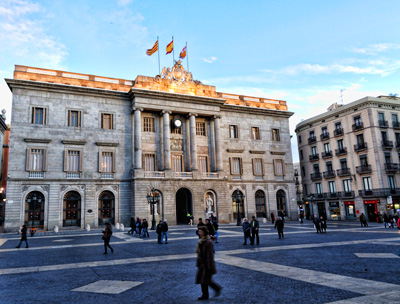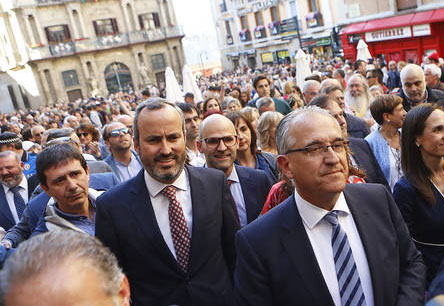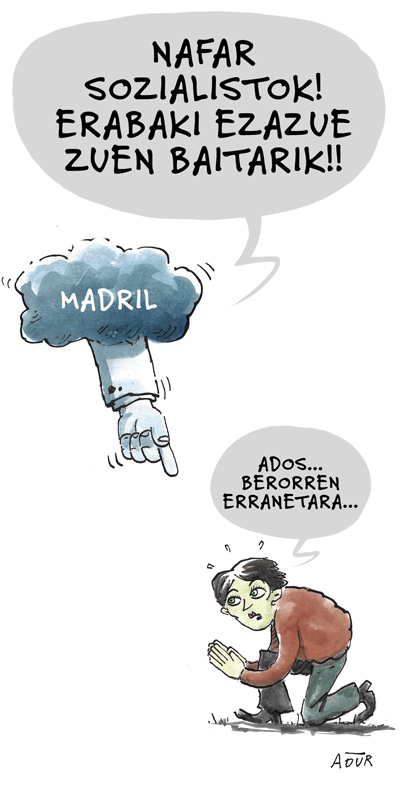The crisis of the regime, if any, is in the nations
- From the point of view of the Spanish State as a whole, these elections of 26 May have been considered as the second round of the Spanish elections in April, although there have been other agendas at local level (especially in territories where there are strong sovereign or independence movements that are not Spanish). In the case of national parties, it has been understandable, as the Spanish framework benefits these parties.

From the point of view of the entire Spanish state, these elections of 26 May have been considered as the second round of the Spanish elections in April, despite the fact that the agendas have been local (especially in territories where there are strong sovereign or independence movements that are not Spanish). In the case of national parties, it has been understandable, as the Spanish framework benefits these parties.
These elections, apart from the European elections, have been both municipal and autonomous, in this case in twelve communities, including Navarre. In a general reading, the Socialist Party has been strengthened by victory in many communities, linked to the fall of Podemos and the positive results of the April elections. It should be remembered that until just over a year ago the PSOE was in a deep crisis, far from the hope of achieving results such as those on Sunday. But that reading is bitter about the results of the People’s Party. In general, pp has not suffered an absolute decline and has achieved a symbolic victory: To govern Madrid with other right-wing and far-right forces, both in the capital and in the community, and that Citizens do not surpass it. Likewise, the surrounding space of Podemos and IU has suffered a severe blow in many capitals, and on many occasions its project has been related to the division and hakes of the eternal left, far from the wishes of hegemony of Ernesto Laclete. Therefore, the PSOE has been strengthened from this April-May electoral marathon in Spain, arranged for a rather long and unelected cycle.
The Socialist Party is strengthened by its victory in many communities, linked to the decline of Podemos and the positive results of the April elections.
In this context, in the municipal elections, all eyes have turned to Madrid and Barcelona. In general, the first city has been a sample of Spanish territory from the national point of view. There was an agonistic battle between the centre-left and the hard right, including the equation of post-Francoist Vox. The People’s Party intended to curb the Sanchez effect of the April elections by symbolically entrenching itself in the Spanish capital, and it can be said that it has succeeded. This result gives a significant nuance to the achievement of the PSOE.
From the point of view of Euskal Herria, what happened in Catalonia is particularly relevant. In the last decade, the core of the confrontation linked to the national question and sovereignty has shifted from Euskal Herria to Catalonia, and lately the ties between the independence of both countries have been strengthened. The evolution of independence is a long process that cannot be interpreted only in the electoral arena. But, from this point of view, the struggle between the two main political branches of Catalan independence has been palpable. Until now, in the conflict between Esquerra and Junts per Catalunya (post-Convergència political space), ERC has not managed to impose itself on the Junts area, with the exception of the Spanish elections in April, held in Catalonia. Thus, the fighting remains open after the Sunday elections, since, although the Puigdemont list has been easily imposed on ERC in the European elections, Esquerra has been imposed on the councils in Catalonia. The conflict between the two propositions of independence will therefore continue.
From the point of view of Euskal Herria, what happened in Catalonia is particularly relevant. In the last decade, the focus of the confrontation linked to the national question and sovereignty has shifted from Euskal Herria to Catalonia, and in recent times the links between the independence of both countries have been strengthened.
This confrontation has had a very special shape in the Catalan capital, which has been surprised by the result. While in the past elections was the convergent space with the M15 municipal experiment (led by activist Ada Colau), this time he has only held the second one, this time as mayor rather than as activist. And in front, with the rudder of the capital of independence, there has been a large leftist republican space led by Esquerra. It has been significant, in this sense, that the list of Esquerra joins both the guidelines of Ernest Maragall that comes from the PSC and the transformative sovereign lines that come from Catalunya in Comú with the Elisenda Alamany in the city. On Sunday, Ernest Maragall imposed himself on Colau on the first day, although he tied up with councillors. If Esquerra succeeds the mayor, independence would achieve a new symbolic victory in this line, in which an international referent such as Barcelona would join his.
But outside Catalonia, the election results show a different picture than four or five years ago. At that time, the crisis in the system of 78, which was discussed in some sectors, was not apparent. Remember that there was also talk of pascalisation, in reference to the clear surprise suffered by the Greek Social Democratic Party PASOK from the side of Syriza. On this occasion, the so-called “municipalities of change” have been harmed by the electoral process (with exceptions such as Cadiz or Valencia) and, in general, the bipartisan system appears strengthened from the ballot box on 26 May. The possibilities of political change and democratization are strengthened in the periphery of the Spanish State, especially in Catalonia, but also in Hego Euskal Herria and, to a lesser extent, in other territories. Anyone who wishes to deal with the regime must therefore also address the national issue.
Professor of Sociology at UPV/EHU
In the drafting of these lines, the new quadripartite of Navarra has just reached a programmatic agreement. The quadripartite is new, because the PSN enters and leaves EH Bildu. They also agreed that the Socialists have vetoed those of Bildu, who have ensured that they are not... [+]
In the summer of 1977, thousands of people from the Freedom March entered the camps of Arazuri, in Pamplona, in columns and filled with ikurriñas, shouting that Navarre is the Basque Country. Twenty years later I had the opportunity to interview Juan Cruz Alli, and in... [+]
Ada Colau will remain in the position of Mayor of the Catalan capital, in a context difficult to imagine before the election campaign: With the eight votes in favour of the PSC, the three votes in favour of the candidature of former Prime Minister Manuel Valls, supported so far... [+]
On 19 June, while he was in the constitutive session of the new Parliament of Navarre, on the front sidewalk, there were about 25-30 men behind a banner. They weren't relatives of the prisoners, they weren't workers of a company in crisis, they weren't even Euskaltzales worried... [+]
What does it mean to achieve good results in the elections? Ideologically, parties that coincide with the status quo tend to achieve institutional power and, furthermore, prefer to submit to it all political analyses. In the elections, what is well done is rewarded. And it's... [+]
What affects us when we vote? What ideas, intentions and emotions are there? Veiled political thoughts or elaborate considerations that reflect deeply and then unfold deep roots in our thinking? That we do not know where we have received the beliefs that we collect, as the... [+]






















